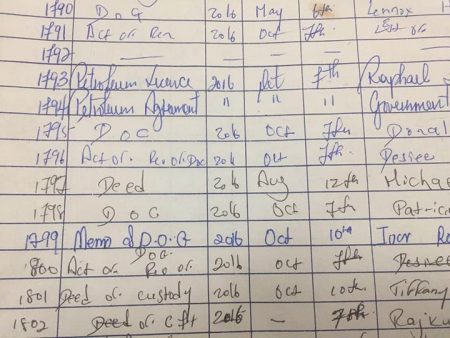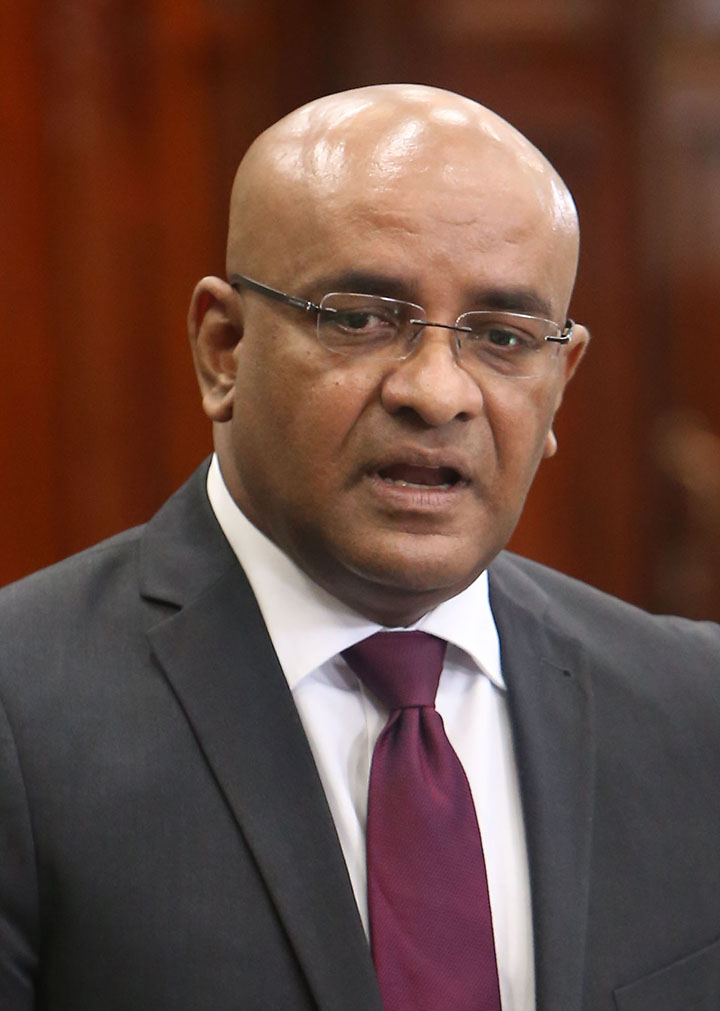The enshrining of the US$18m signing bonus in the 2016 agreement between Guyana and ExxonMobil’s subsidiary was clearly the reason why the government kept the document hidden, according to Opposition Leader Bharrat Jagdeo.
In a statement yesterday following the government’s long-awaited release of the petroleum agreement, Jagdeo said that the reason for refusing to make the contract with ExxonMobil public over a year and a half after it was signed, in spite of a relentless campaign by the media, many civil society was made apparent by the inclusion of the signing bonus in the agreement.
He charged that the contract exposes the false claims by the APNU+AFC government that a clause inserted in the Petroleum Act by the PPP/C and national security concerns prevented its disclosure.

“The primary reason for keeping the agreement secret, despite it being registered at the Deeds Registry which made it a public document, is contained in article 33, which provides for a signing-bonus of US$18 mln.
“The signing bonus as revealed by diligent work done by the media, was paid into a secret account at the Bank of Guyana with strict instructions not to transfer it into the Consolidated Fund, in flagrant violation of Article 216 of the Constitution and the Fiscal Management and Accountability Act. Several Cabinet members refused to acknowledge the existence of the signing bonus. The Minister of Finance even said was a `figment of the imagination’ and that they never received a signing bonus nor did they ask for one although it was already paid into the secret account since September 2016”, the Opposition Leader declared.
He said that now that the “sinister plan to squirrel-way the US $18 mln has been exposed there is no compelling reason to keep the agreement secret any longer”.

Jagdeo said that there are still many unanswered questions that the government needs to come clean on, for example who negotiated the signing bonus and how was the figure of US$18 mln arrived at?
Over the next few days he said that he will examine the contract in detail and offer perspective on it.
Meanwhile, former Attorney General Anil Nandlall also lambasted the secrecy around the document since it was meant to be a public document.
“The first act of deception is that this document was filed as of record at the Deeds Registry of the Deeds and Commercial Registry Authority since 2016. This is a public statutory authority that is autonomous of the Government run and managed by a Board of Directors.
“This was deliberately concealed from the population because all documents filed at this agency forms part of the public records of Guyana and are available to the public.
“So when the Government refused to make a document filed at this institution public, not only was it deceiving the population, it was violating the law and obviously interfering with the functioning of an autonomous statutory agency by instructing it not to make a `public document’, available to the public. And these are the people who promised transparency and accountability!”, he declared in a Facebook post.
Nandlall later supplied a copy of the entry made of the The enshrining of the US$18m signing bonus in the 2016 agreement between Guyana and ExxonMobil’s subsidiary was clearly the reason why the government kept the document hidden, according to Opposition Leader Bharrat Jagdeo.
In a statement yesterday following the government’s long-awaited release of the petroleum agreement, Jagdeo said that the reason for refusing to make the contract with ExxonMobil public over a year and a half after it was signed, in spite of a relentless campaign by the media, many civil society was made apparent by the inclusion of the signing bonus in the agreement.
He charged that the contract exposes the false claims by the APNU+AFC government that a clause inserted in the Petroleum Act by the PPP/C and national security concerns prevented its disclosure.
“The primary reason for keeping the agreement secret, despite it being registered at the Deeds Registry which made it a public document, is contained in article 33, which provides for a signing-bonus of US$18 mln.
“The signing bonus as revealed by diligent work done by the media, was paid into a secret account at the Bank of Guyana with strict instructions not to transfer it into the Consolidated Fund, in flagrant violation of Article 216 of the Constitution and the Fiscal Management and Accountability Act. Several Cabinet members refused to acknowledge the existence of the signing bonus. The Minister of Finance even said was a `figment of the imagination’ and that they never received a signing bonus nor did they ask for one although it was already paid into the secret account since September 2016”, the Opposition Leader declared.
He said that now that the “sinister plan to squirrel-way the US $18 mln has been exposed there is no compelling reason to keep the agreement secret any longer”.
Jagdeo said that there are still many unanswered questions that the government needs to come clean on, for example who negotiated the signing bonus and how was the figure of US$18 mln arrived at?
Over the next few days he said that he will examine the contract in detail and offer perspective on it.
Meanwhile, former Attorney General Anil Nandlall also lambasted the secrecy around the document since it was meant to be a public document.
“The first act of deception is that this document was filed as of record at the Deeds Registry of the Deeds and Commercial Registry Authority since 2016. This is a public statutory authority that is autonomous of the Government run and managed by a Board of Directors.
“This was deliberately concealed from the population because all documents filed at this agency forms part of the public records of Guyana and are available to the public.
“So when the Government refused to make a document filed at this institution public, not only was it deceiving the population, it was violating the law and obviously interfering with the functioning of an autonomous statutory agency by instructing it not to make a `public document’, available to the public. And these are the people who promised transparency and accountability!”, he declared in a Facebook post.
Nandlall later supplied a copy of the entry made of the document but which was kept from the public.





